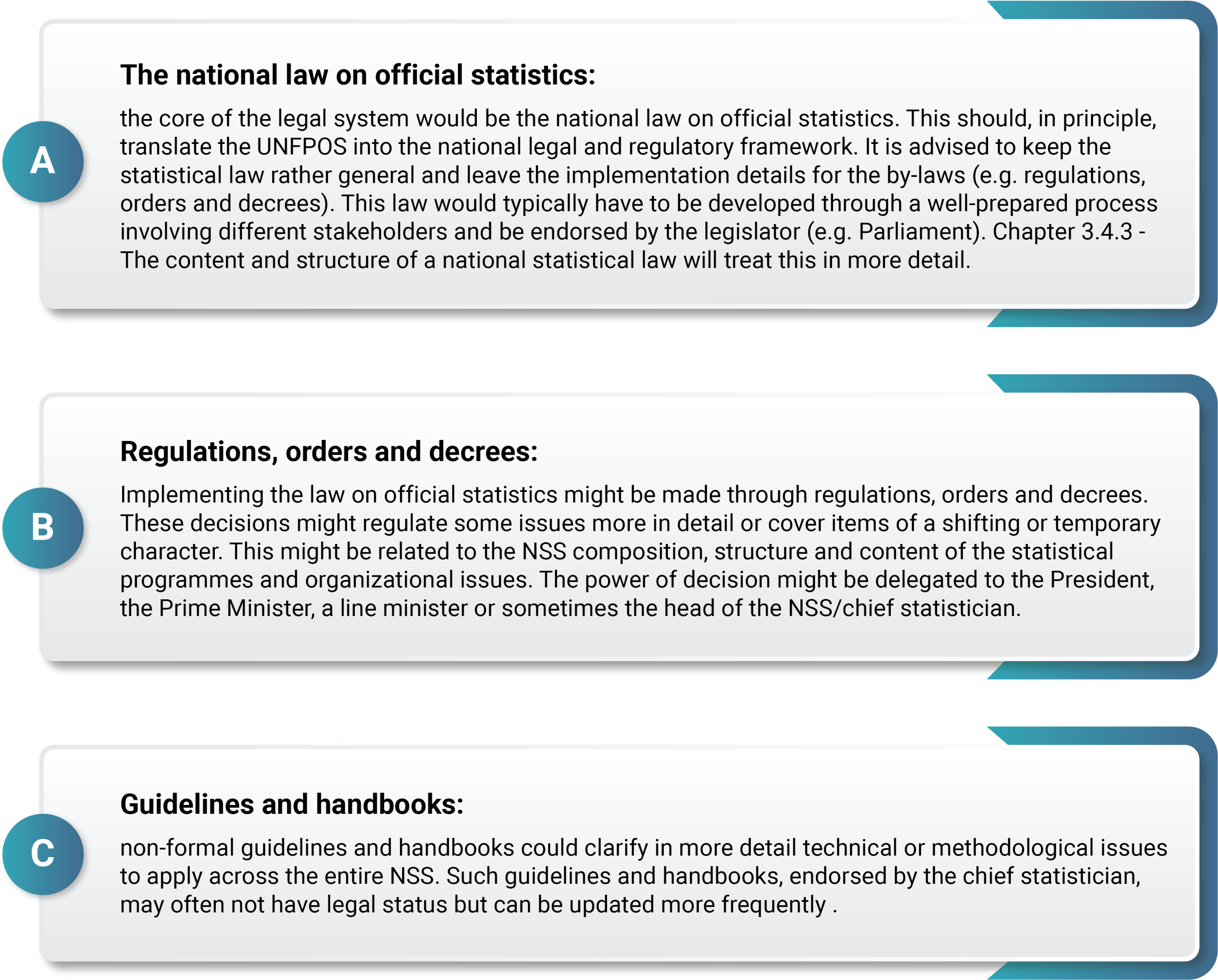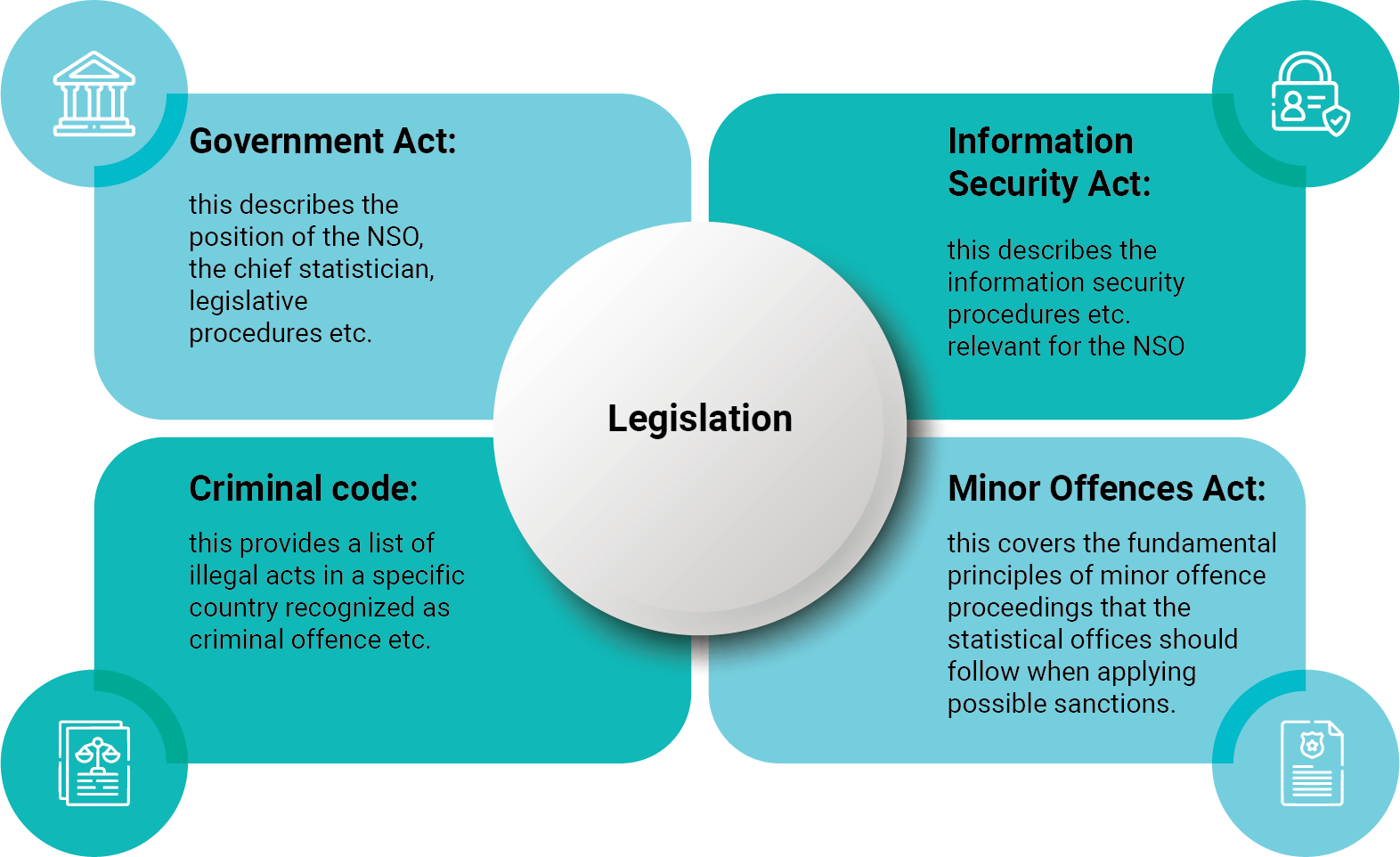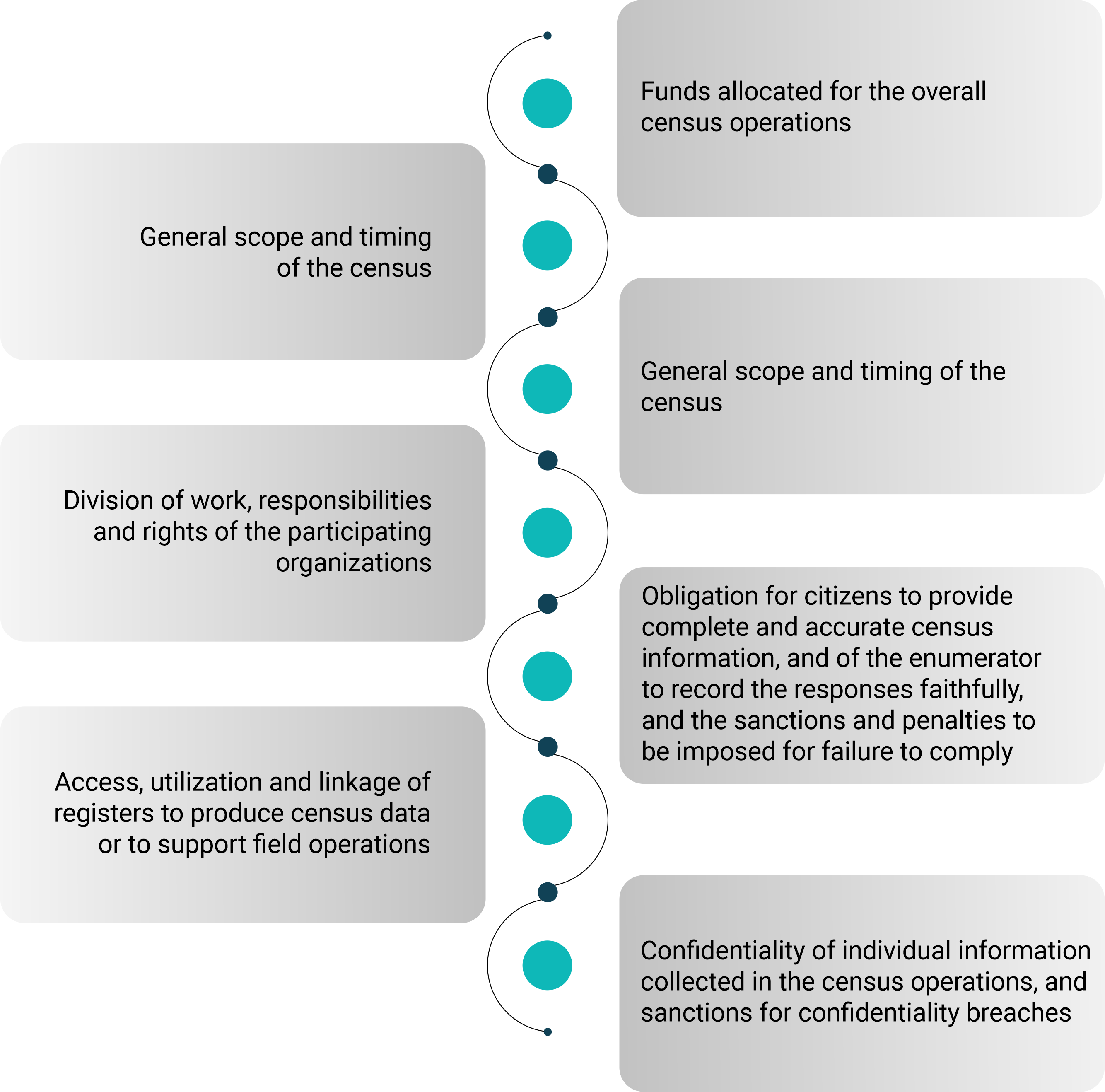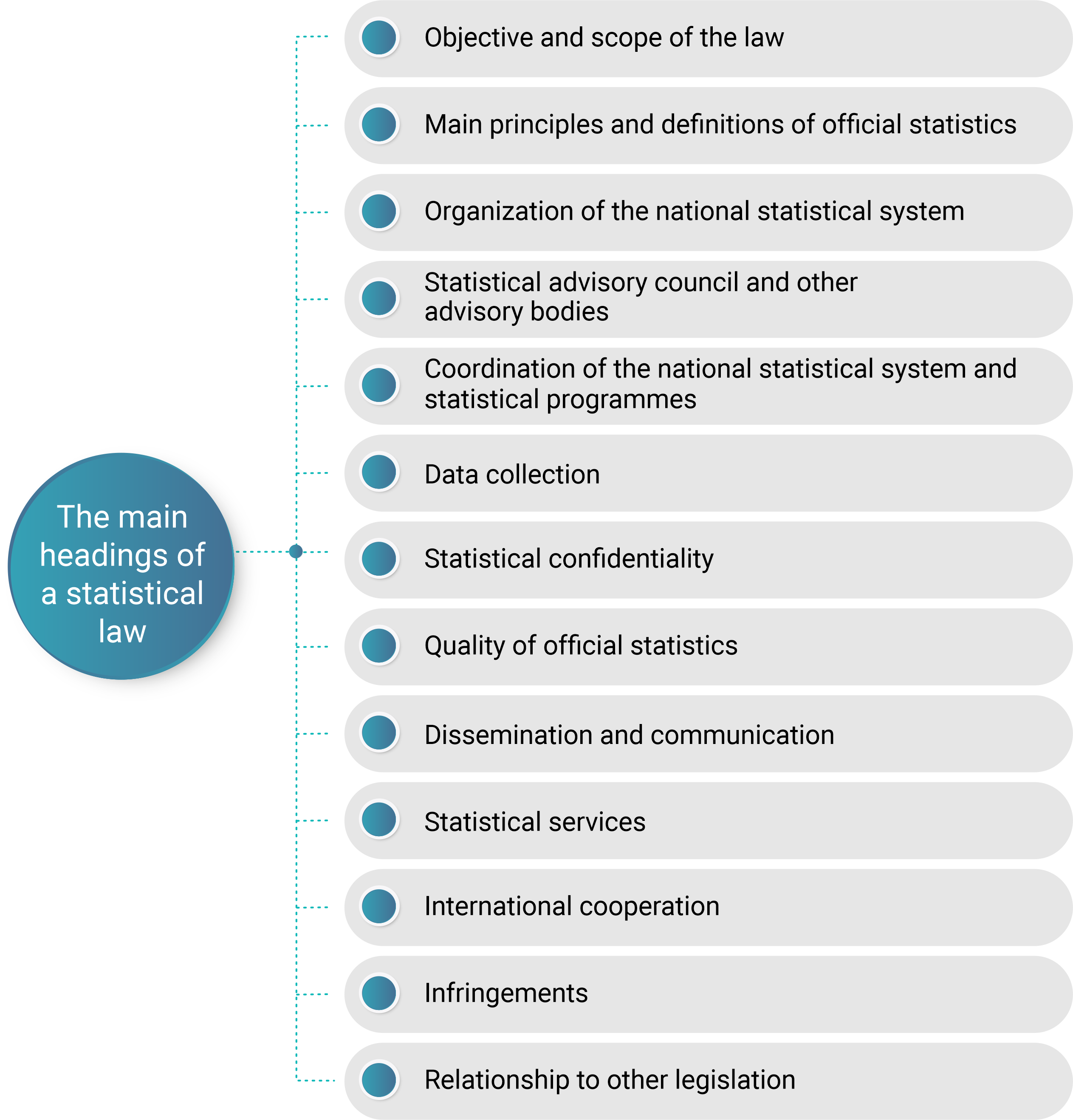Well-developed national legislation regulating the production of official statistics is necessary to ensure the implementation of the principles described in Chapter 3.2 — UN Fundamental Principles of Official Statistics. The overall target is to ensure the production of official statistics with a high level of quality, meeting users' needs and being trusted by users and other stakeholders.
As legal structures and traditions vary between countries, legal frameworks for the production of official statistics have to be adapted to the national context.
3.4.1 Types of legislative frameworks
The Guidance on modernising statistical legislation, UNECE 2018 () discusses the issue of flexibility versus stability in section 3C6.
One characteristic of a flexible legislative framework is developing and maintaining definitions, methodologies and standards for official statistics without the need to amend legislation when they change. It may even be better not to list the different producers of official statistics belonging to the NSS in the statistical law, but to regulate only the procedure for their identification and criteria for which products should be part of the national statistical programme. Similarly, it is advisable to describe the statistical domains and outputs of the NSO/NSS in general terms rather than listing them one by one. Such lists may be understood to be complete and preclude abandoning redundant statistics and prevent the development of new statistics.
A statistical system that on one side ensures the stability of key principles and structures with the necessary flexibility might combine several legal instruments:

For instance, a national code of practice might have its basis in the national law on official statistics but then be developed and updated through regulations, orders or decrees, if needed. However, implementation guidelines of the code could be endorsed by the chief statistician in consultation with other producers of official statistics.
3.4.2 The relationship between legislation in the field of official statistics and other legislation
The Guidance on modernising statistical legislation, UNECE 2018 () provides in Chapter 6C a detailed discussion of many of the issues to be considered. The document recommends that the statistical law prioritise the safeguard of the UNFPOS, avoiding, in particular, any breaches with the principle of confidentiality and professional independence of statistical authorities. In the proposed common elements of statistical legislation, it is thus, stated that:
“Any other legal act referring to official statistics shall be adapted to comply with the statistical law. In case of conflicting legislation, the provisions of the statistical law or another act based on or mentioned in the statistical law shall apply.”
The document further identifies legislation that could be referred to in the statistical legislation:

Furthermore, statistical legislation might have an impact on the following legal acts:
■ Public Servants Act: The Public Servants Act could conflict with the appointment procedure and the mandate of statistical staff. To comply with the principle of professional independence of statistical production, the appointment procedure, the mandate and reasons for dismissal of the Head of statistical office should be defined in the statistical legislation, to avoid suspicion of political interference.
■ Public Finance Act: The budgetary provisions of the Public Finance Act may affect the process for budget allocation to the NSO and the statistical system. Thus, the NSO and other partners should be directly involved in the planning and budgetary process.
■ Legal acts governing administrative or other data sources: e.g. registers, Big Data, privately held databases. Statistical legislation typically should give a clear mandate for access to data from all administrative data sources and existing registers held by public authorities and private data holders.
However, there might be cases where legislation regarding the protection of individual data in administrative sources do not allow the transmission of these data, with identifier to producers of official statistics, even if the statistical law provides a legal basis for this transmission. In this case, the option would be to strengthen the statistical law provision allowing producers of official statistics to access administrative data at micro-level and ensure when legal acts governing data sources are revised to allow this access explicitly for statistical purposes.
The same issue might arise regarding access to business data and other private parties' databases containing personal data. In the future, to be able to use data from these sources, changes in relevant legislation and necessary agreements on appropriate usage and pricing might be necessary.
■ Electronic Communication Act: The Electronic Communication Act may include an explicit ban of allowing access to electronic communication data for statistical or any other purpose, except for clearly defined purposes, such as national security, defence of public security. As data generated in publicly available electronic communications networks could be instrumental for the production of official statistics, necessary amendments in relevant legislation could be foreseen.
■ Privacy and Data Protection Act: The Privacy and Data Protection Act regulates the protection of individuals with regard to the processing and sharing of personal data. Official statistics are often provided exemptions from the right of persons to review, correct or remove their data because data held by statistical authorities are not used to make any decisions about individuals. This exemption should also be part of the statistical legislation.
One issue, related to this, is the full protection of individual data obtained exclusively for statistical production that should be ensured in the statistical legislation. These data should not be used for any investigation, surveillance, legal proceedings, administrative decision making or other similar handling of matters concerning a natural or a legal person by any authorities or international organizations. Thus, full protection of data within the statistical system should be provided, even if some other national laws might open up for the possibility also to access such data.
■ Archiving Act: The Archiving Act provides for the procedure and archiving of data of national interest. The Act applies when statistical data become part of the public archive and provide obligations for electronic archiving. There could be some conflicting regulation between the statistical and archiving legislation, for instance, about national interest and what is not, who could be the data's warden and how this data should be archived, including the technological environment. Divergences should be reviewed when revising either legislation.
■ Public Information Access/ Freedom of Information Act: The Public Information Access Act governs the procedure which ensures everyone free access to and right to reuse public information held by state bodies, local government bodies, public agencies, public funds and other entities of public law, public powers holders and public service contractors. As defined in statistical legislation, confidential data should be an exemption to the general rule of free access to the data held by the government bodies.
The Public Information Access Act should define confidential statistical data referred to in the statistical law to avoid conflicting legislation. This access for statistical purposes should be treated as an exemption in the Public Information Access Act.
■ Census legislation in relation to the statistical legislation: The preparation and conduct of a population and housing census, regardless of the methodology, requires a legal basis, be it the general regulations of the statistical law, a specific article in the statistical law or a dedicated census act. If such an act exists, the relationship between a national law on official statistics and specific census act should be harmonised to ensure consistency related to mandate, handling of confidentiality, dissemination, etc.
The Guidance on modernising statistical legislation also discusses some legal aspects related to censuses in Chapter 8C. It is mentioned that this legislation should typically regulate the following issues related to censuses:

■ Legislation regulating the activity of other producers of official statistics: the laws and rules regulating the activity of other producers of official statistics in MDAs and other public authorities such as the Central Bank, might not be in line with the UNFPOS and the statistical.
The Guidance on modernising statistical legislation discusses in Chapter 8D the collaboration between NSOs and the Central Banks, including legislative issues. It also emphasizes that the national statistical law should apply to all activities related to official statistics and carried out by any producer of official statistics. It is stressed that macroeconomic, financial and monetary statistics produced within the Central Bank, are key official statistics. Thus, it is proposed that the entities of Central Banks that produce official statistics should be recognized as statistical authorities and be considered part of the NSS. In return, as members of the NSS, these entities must be professionally independent of the rest of their respective organizations, and their activities follow the national statistical law and the UNFPOS. To adapt to this situation, an amendment of these laws might be necessary.
3.4.3 The content and structure of a national statistical law
Several efforts have been made to propose a model of national laws on official statistics. These include the following:
■ The annex of the previous Handbook of Statistical organization ();
■ The Model Bill on Statistics in the Caribbean region () addressing the specificities of small island developing states in that region;
■ The Model Statistics Law in the Context of the African Charter on Statistics () is also an example aiming at assisting countries that would revise their legislation in that region.
The Guidance on modernising statistical legislation, UNECE 2018 () is based on and extends the Generic Law on Official Statistics (GLOS) developed by UNECE in cooperation with EFTA and Eurostat, with the support of the United Nations Statistics Division. The Conference of European Statisticians reviewed the Guidance at its plenary session, 18-20 June 2018, endorsed the Guidance with some amendments and supported the proposals for further work including reviewing the Guidance in five years. The Generic Law on Official Statistics for Latin America (GLOS-LA) was adopted in 2019 by the Statistical Conference of the Americas of the Economic Commission for Latin America and the Caribbean at its tenth meeting. Its purpose is to provide a regional model for Latin American countries interested in formulating or reformulating the legal basis for the functioning of their NSSs and the production of official statistics. The GLOS-LA is an adaptation of the GLOS to the specific Latin American context. In the meantime, the UN Economic and Social Commission for Western Asia (ESCWA) developed the Guide on the Generic Law for Official Statistics in Arab countries (). The publication, issued in September 2021, provides guidelines to establish statsitical legislation needed to support the modernization of the statistical systems in the region.
The rest of this chapter is mainly based on these latest generic laws and guidance.
The main headings of a statistical law
The Guidance on modernising statistical legislation suggests the following headings in a law on official statistics:

Some main issues to be covered in a statistical law
Some of the key issues to be covered in a statistical law are as follows:
■ The definition of official statistics, to be distinguished from administrative information, and in compliance with the UNFPOS;
■ Definitions of the key concepts used in the law and necessary for the interpretation of the legal text, such as statistical survey, administrative data, statistical unit, individual data etc.;
■ Criteria for identifying the national statistical system: who are the producers of official statistics;
■ The tasks for the NSO and the chief statistician, especially in relation to coordination and planning;
■ The process for developing multiannual and annual programs, user consultations, the involvement of the Statistical Advisory Council, decision process etc.;
■ The mandate for data collection ensuring access to administrative data and other data sources;
■ The principles and procedures for handling confidential statistical data, securing exclusive use for statistical use of individual data;
■ Quality criteria and mechanisms/procedures for ensuring high quality;
■ Principles for dissemination securing equal treatment of users and user-friendly dissemination.